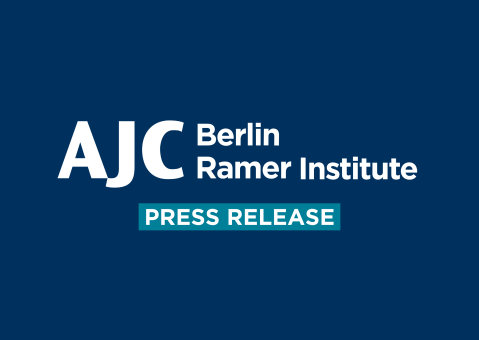Share on
10.10.2024 This interview was first published by t-online.
Since the attacks on Israel, Jewish institutions in Germany are in greater danger. An expert explains who is threatening them. Following the Hamas terror attacks on Israel, the question of the safety of Jews and those working in Jewish institutions has also arisen here in Germany. Remko Leemhuis himself is not Jewish, but as the director of the American Jewish Committee office in Berlin, he advocates for the security of Jews in Germany. In an interview with t-online, he expresses the hope that the Germans’ solidarity with Israel has changed a bit this time. Leemhuis also reveals why he wouldn’t move to Berlin-Neukölln, and what he would like to see in German policy.
Dr. Leemhuis, since the attacks by Hamas in Israel, supporters of a Palestinian organization went on the streets of Neukölln, celebrated the attack and distributed sweets to passersby. What did you think when you saw that?
It is completely abhorrent to celebrate the murder of hundreds of civilians. Those people stand on the wrong side of history. There is no justification or excuse for those heinous acts. Law enforcement needs to now investigate whether criminal offenses were committed.
Has anything changed in the Germans’ solidarity with Israel this time?
Yes, I think so. There is more widespread solidarity now as compared to previous attacks. This time, people are coming together, regardless of their political stance, and condemning the attacks together. I hope that this solidarity will continue and endure over the coming weeks and months, which are likely to be very hard for Israel.
The party leaders of CDU, CSU, SPD, FDP and the Greens drafted a declaration very quickly and once again emphasized Israel’s security as a national raison d’état. Is that a good sign?
That's a good start. I cannot recall such a thing ever happening before. The parties should stick to their united course. I want to emphasize this: Hamas and the Islamic Jihad are responsible for all casualties on both sides. Israel did not choose the situation, nor did it want war. Israel’s security therefore cannot be the subject of partisan political disputes.
What else do you expect from the German government?
Above all, Germany must rethink its Iran policy. Iran was directly or indirectly involved in the attacks. Germany needs to take the initiative in the EU to put the Revolutionary Guard and Hezbollah in its entirety on the EU terror list.
Let us have another look at antisemitism in Germany: The number of antisemitic crimes recorded by the police has been rising sharply in the past years and has doubled since 2015. In 2022, an average of seven offenses were committed - per day. Do you have an explanation for that?
There is certainly a greater willingness to report these crimes. But of course, it also has to do with the overall social climate. We live in a fragmented and polarized society. In times of crisis, antisemitism rises. Historically, this has always been the case. Some people go looking for guilty parties and easy answers. Usually, they blame the Jews.
What is the greatest danger for Jews in Germany?
That depends on the location. The danger in eastern Germany is different from in Berlin-Neukölln or Kreuzberg. We saw the attack in Halle in 2019 - by a right-wing terrorist. In Berlin, many attacks come from the Muslim community.
Who poses a threat to you as AJC?
There’s a whole range of milieus that could pose a threat. There are the Querdenker, Reichsbürger, Turkish Fascists, Islamists and neo-Nazis.
Do you know of any stories of Jews who are leaving Germany for those reasons?D
We’re not as far as France, which experienced a major wave of migration to Israel. This trend started in 2015, when the editorial office of Charlie Hebdo and a Jewish supermarket in Toulouse were attacked. I do not know of anyone among my acquaintances here who has concrete plans to leave Germany. But for many Jews, Israel is always an option they keep in mind.
Are there regions or city districts in Germany that Jews actively avoid? Or even move away from?
I know of a few who definitely do not show their Jewish identity in Neukölln, who hide their star of David necklace. I am not Jewish myself, but I would not move to Neukölln either, because I am at risk as a representative of a Jewish organization. I’m not incredibly well-known, but one recognition would already be enough to endanger me.
What do you demand of other non-Jews in Germany?
It would be a start to recognize the problem of antisemitism. Studies show: About one quarter to one third of Germans hold antisemitic stereotypes. That means everyone has these people in their circle of acquaintances or colleagues. If someone makes an antisemitic statement, we must contradict them.
Do you think that the government does enough against antisemitism?
Yes, but with some limitations. For a long time we called for an antisemitism commissioner. This position has been in place at a federal level for five years now. This has not solved all the problems. But the communities now have a specific contact person, also in the states. In addition, the criminal law has been tightened. Antisemitism as a motive increases the penalty.
Where are things not going so well?
The Documenta case in Kassel last year clearly shows how badly antisemitism is handled.
The art exhibition included a painting depicting Jews caricatured in antisemitic stereotypes.
For six months, there were people raising concerns about this. Their warnings were simply ignored. To put it bluntly: On the days commemorating the Shoah, politicians hold nice speeches and warn the public of the dangers of antisemitism. A bit later, however, some of them let themselves be photographed smiling with representatives of the Iranian regime.
Do you talk with representatives of the AfD?
No. We have never done so and we will not. We have nothing to talk about with this party. Antisemitism is part of the AfD’s core program.
Otherwise you speak with all parties represented in the Bundestag?
Yes, with all democratic parties. To be honest, it’s actually difficult to talk to the Left Party (Die Linke) as well. There we only have individuals with whom we speak regularly.
What would AJC Berlin do if the AfD came to power?
I haven’t fully thought through this scenario, because I don’t think it’s realistic on a federal level. It would also raise some fundamental questions, such as what the future of German democracy would look like. We see how in other countries parties like the AfD can quickly destroy the substance of democracies. I can, however, rule out the possibility that we would then talk with representatives of the AfD.
You’re celebrating the 25th anniversary of the AJC Berlin office. AJC was one of the first international Jewish organizations that returned to Germany. Why not earlier than 1998?
Some would say: Why so early? For a lot of Jews, Germany was taboo after the Shoah. Resuming contact with Germany wasn’t a particularly popular position in the U.S.. AJC reestablished contact with Germany quickly after the end of World War 2. The organization was founded in 1908, and among the founders were emigrated German Jews. That’s why there has always been a tight link to Germany.
Why did AJC go to Germany nevertheless?
Germany is too big to be ignored. It was clear for our predecessors that in a reunited Germany, Berlin would become one of the most important cities in the EU, if not the most important one. We wanted to go to Germany as a globally active human rights organization. The country has, due to its history, a special responsibility which will never end.
What is, in your opinion, the biggest achievement of AJC over the years?
We have many, but one that is difficult to measure is that we have upheld contacts with Israel and the U.S. when it was politically not easy to do so. This has enabled us to maintain mutual understanding at a societal level. That is important, especially in times of increasing polarization.



